Nouns Study Guide
What are Nouns?
Nouns are words that represent a person, place, thing, or idea. They are the building blocks of sentences and are essential for communication.
Types of Nouns
There are several types of nouns:
- Common Nouns: These are general names for people, places, or things, such as "teacher," "city," or "car."
- Proper Nouns: These are specific names for people, places, or things and always begin with a capital letter, such as "Mary," "Paris," or "Ford."
- Concrete Nouns: These are nouns that can be perceived by the five senses, such as "apple," "dog," or "mountain."
- Abstract Nouns: These are nouns that represent ideas, concepts, or emotions, such as "love," "freedom," or "honesty."
- Collective Nouns: These are words used to describe a group of people or things, such as "team," "family," or "herd."
Functions of Nouns
Nouns can function in different ways within a sentence:
- Subject: The noun that performs the action in a sentence.
- Object: The noun that receives the action in a sentence.
- Direct Object: The noun that directly receives the action of the verb.
- Indirect Object: The noun that receives the direct object.
- Subject Complement: The noun that renames or describes the subject.
Examples
Here are some examples of nouns in sentences:
- The cat is sleeping on the bed.
- Mary visited Paris last summer.
- The sunflower swayed in the breeze.
- Her words were filled with wisdom and kindness.
- The herd of elephants marched through the jungle.
Study Tips
Here are some tips for studying nouns:
- Practice identifying nouns in sentences.
- Make a list of common and proper nouns you encounter in daily life.
- Create flashcards with different types of nouns and their definitions.
- Write sentences using different types of nouns to reinforce your understanding.
- Read books and identify nouns in the text to improve your recognition skills.
[Nouns] Related Worksheets and Study Guides:
.◂English Language Arts Worksheets and Study Guides Third Grade. Capitalization/Punctuation
Study Guide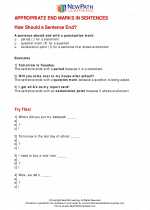 Capitalization/Punctuation
Capitalization/Punctuation  Worksheet/Answer key
Worksheet/Answer key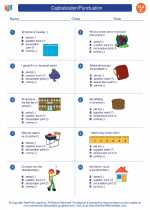 Capitalization/Punctuation
Capitalization/Punctuation  Worksheet/Answer key
Worksheet/Answer key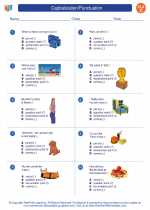 Capitalization/Punctuation
Capitalization/Punctuation  Worksheet/Answer key
Worksheet/Answer key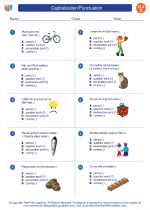 Capitalization/Punctuation
Capitalization/Punctuation  Worksheet/Answer key
Worksheet/Answer key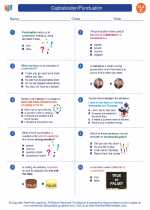 Capitalization/Punctuation
Capitalization/Punctuation  Worksheet/Answer key
Worksheet/Answer key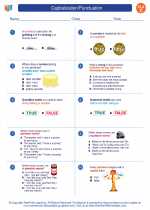 Capitalization/Punctuation
Capitalization/Punctuation  Worksheet/Answer key
Worksheet/Answer key Capitalization/Punctuation
Capitalization/Punctuation 

 Worksheet/Answer key
Worksheet/Answer key
 Worksheet/Answer key
Worksheet/Answer key
 Worksheet/Answer key
Worksheet/Answer key
 Worksheet/Answer key
Worksheet/Answer key
 Worksheet/Answer key
Worksheet/Answer key
 Worksheet/Answer key
Worksheet/Answer key

The resources above cover the following skills:
Controlling Language
Apply standard English punctuation and capitalization in written language
Use end punctuation correctly